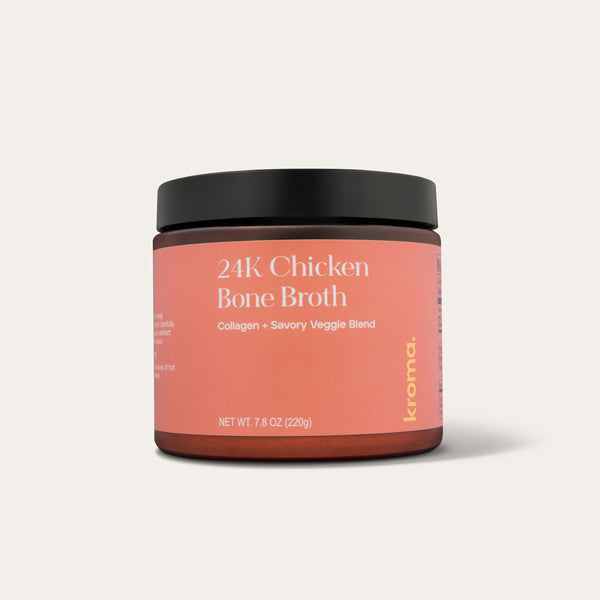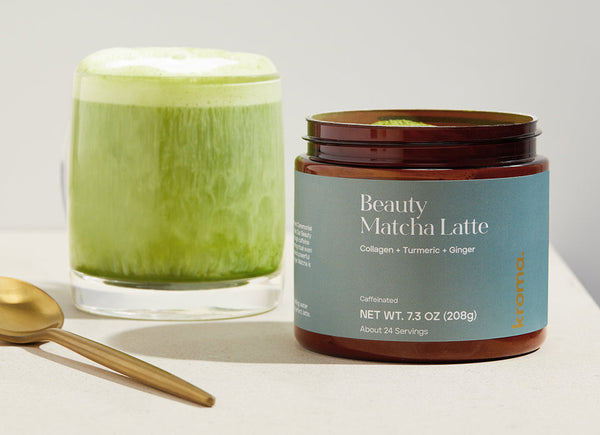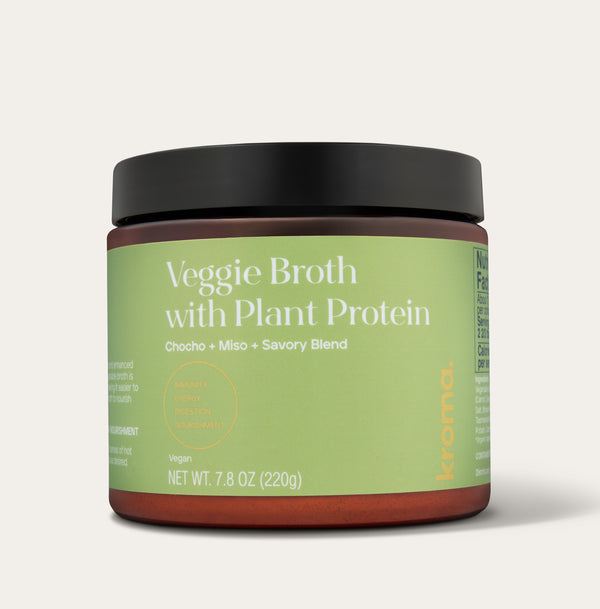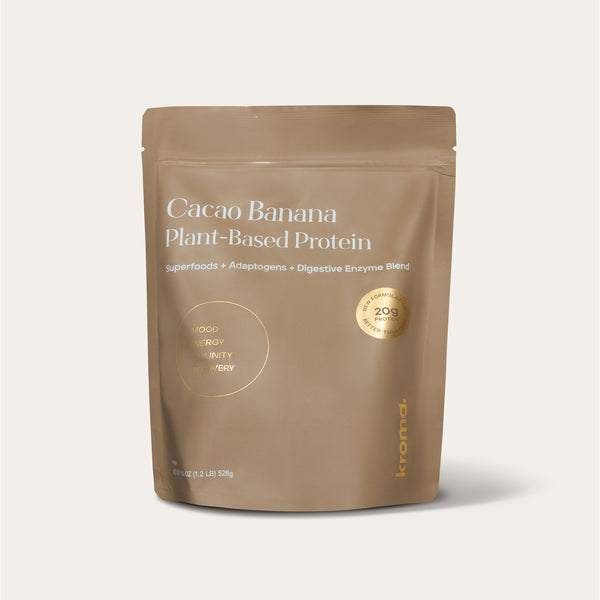Have you ever realized how connected your mind and body are? The mind-body connection is real and powerful. The way you nourish your body and your mind are interconnected and Kroma is here to help you find foods that support your body and your mind.
In this resource, we’ll go over what the mind-body connection is, what causes the mind-body connection, and how your dietary patterns can affect your mental health, your mood, your cognitive function, and even your quality of sleep!
What Is the Mind-Body Connection?
What Causes Mind-Body Connection?
What causes the mind-body connection? Research has shown that parts of the brain that control things like thinking, planning, and pain also control things like blood pressure and heart rate. Stress and anxiety can manifest in the form of headaches, insomnia, aches and pains, stiff neck, sweating, and fatigue. Pay attention to cues from your physical health to see if your mental and emotional health could use some attention, and vice versa.
Understanding the Relationship Between Mental Health & Food
The food you eat has a surprisingly large impact on the way you feel. If you’re struggling with your mental health, the good news is that adding a few things to your diet can make a significant difference.
For example, an increased fruit and vegetable intake has been shown to reduce symptoms of depression. The Mediterranean diet (fruits, vegetables, fish, whole grains, and healthy fats) has also shown the same results. Dealing with stress and anxiety? Decrease your alcohol, caffeine, and sugary food intake. Looking for a generally-improved well-being? The more nutrients in your diet the better!
How does it work? It’s all about the connection between your gut and your brain. The gut sends chemical messages to the brain that regulate sleep, pain, appetite, mood, and emotion.
Dietary Patterns & Mood Regulation
Processed foods are linked with a higher risk of depressive symptoms, as well as sweet beverages, fried food, high-fat dairy, and processed meat. So what foods are friendly toward your moods? Go for trout, chocolate, fermented foods, egg yolks, nuts, chicken, oysters and saffron!
Want to take the guesswork out of your food-choosing routine? Try Kroma’s 5-Day Reset. The reset makes it easy to fill your life with foods that support your mood and overall well-being with five days of prepared meals and drinks to get you started.
Dietary Patterns and Cognitive Function
Your dietary pattern can contribute to your cognitive performance and overall brain health. Foods like fatty fish and walnuts that are high in omega-3 fatty acids and antioxidants like berries and broccoli support brain health. Some foods, such as turmeric, eggs, fish, and blueberries can also provide some protection against Alzheimer’s and Parkinson’s and can improve memory and concentration.
Foods that help boost brain function:
-
Fruits and vegetables (especially blueberries, oranges, broccoli, and dark and leafy greens)
-
Mediterranean diet
-
Nuts and seeds
-
Salmon and fatty fish
-
Beans
-
Lean red meat
-
Avocados
-
Whole grains
-
Brown rice
-
Dark chocolate
-
Quinoa
-
Tea and coffee
-
Turmeric
-
Eggs
Tips for implementing brain-boosting foods into daily meals:
-
Eat eggs for breakfast
-
Switch out white rice for brown rice and white bread for wheat bread
-
Make a homemade trail mix with nuts, seeds, and dark chocolate
-
Make recipes that take advantage of the fruits and vegetables that are in season
Dietary Patterns and Sleep Quality
Good nutrition leads to great sleep which leads to overall well-being! Healthy foods with plenty of nutrients have been shown to increase sleep quality, while less-healthy foods such as processed and high-energy foods can contribute to sleep restriction and short sleep duration.
Foods that promote sleep quality:
-
Tryptophan-rich foods
-
Antioxidants
-
Melatonin
-
Micronutrients
-
Fruits (especially kiwis and cherries)
-
Milk
-
Fatty fish
-
Nuts
-
Rice
Lifestyle factors that promote sleep quality:
-
Avoid caffeine, alcohol, and heavy meals before sleeping
-
Avoid screens before sleeping
-
Enjoy an herbal tea before sleeping
-
Create a regular sleep schedule
Mindful Eating: Cultivating Awareness and Connection with Food

Mindful eating is a great way to decrease your stress, promote healthier eating habits, and improve your relationship with food. What does eating mindfully mean? It means eating with the philosophy of mindfulness, which includes paying attention to your senses and observing without judgment. It can look like eating without multitasking (putting down your phone) and truly noticing and enjoying the tastes, colors, smells, and textures of your food
Here are our favorite tips for learning how to eat mindfully:
-
Work on eating slower
-
Take breaths between bites
-
Pay attention to and honor your hunger and fullness cues
-
Cultivate gratitude for your food
-
Notice how the food makes you feel
-
Use your five senses as you eat
Being present with your food and learning to truly appreciate it and the good it does for your body can be a game-changer for the way you eat and can introduce more moments of gratitude in your life.
Gaining Healthy Relationships with Food
Just growing up in the society we’re in can make it hard for anyone to have a healthy relationship with food. Maybe you grew up thinking certain foods were “bad” or maybe you have a habit of judging yourself for what you eat or how much you eat. This can be tied to body image difficulties which can be hard to shake.
The key is to give yourself unconditional permission to eat and to treat yourself, your eating habits, and your body with compassion. Find ways to cultivate gratitude for your food and for your body. It’s possible to lose some of the harmful messaging you may have picked up along the way and relearn a new way of thinking about food and your body.
Strategies for developing a positive relationship with food:
-
Don’t diet (diets can lead to restrictive eating patterns, weight gain, and disordered eating)
How Kroma Wellness Helps Nourish the Mind-Body Connection


Kroma Wellness is here to help you with your overall health and well-being with our lineup of natural superfoods. We choose foods that take full advantage of the mind-body connection so you can give yourself the gift of health. At Kroma Wellness, we support you on your path to finding foods that support your mental and emotional health, sleep quality, and more. Try Kroma Wellness today to see the difference!
Other Mind-Body Connection Resources
Looking for more resources for further information on the mind-body connection?
Take a look at these mind-body connection resources:
-
The Body Keeps The Score: Brain, Mind, and Body in the Healing of Trauma by Bessel van der Kolk M.D.
-
What Happened to You? Conversations on Trauma, Healing, and Resilience by Bruce D. Perry and Oprah Winfrey
-
Intuitive Eating: A Revolutionary Anti-Diet Approach by Evelyn Tribole and Elyse Resch
-
Food Psych Podcast with Christy Harrison
Prioritize Your Mind-Body Connection Through Mindful & Proper Dietary Habits
 That wraps up our mind-body connection resource! You’ve learned how to add foods to your life that can improve your mental and emotional health, your mood, your brain health, and your quality of sleep. And you’re ready to improve your relationship with food with mindful eating!
That wraps up our mind-body connection resource! You’ve learned how to add foods to your life that can improve your mental and emotional health, your mood, your brain health, and your quality of sleep. And you’re ready to improve your relationship with food with mindful eating!
What’s the next step? Take your mind-body connection to the next level with Kroma Wellness! Kroma’s 5-Day Reset includes five day’s worth of nutrient-rich meals and beverages. We’re talking antioxidants, vitamins, minerals, collagen, probiotics, superfoods, and adaptogens—foods your body and mind will be grateful for.
Sources:
Mind-body connection: what it is and how to strengthen It | Calm
Mind-body connection is built into brain, study suggests | WashU Medicine
Mind/Body Connection: How Your Emotions Affect Your Health | FamilyDoctor.org
How to Boost Mental Health Through Better Nutrition | American Society for Nutrition
Diet and Mental Health: Can What You Eat Affect What You Feel? | Healthline
8 Foods That May Help Regulate Your Mood | Verywell Health
Nutrition and cognitive health: a life course approach | National Library of Medicine
15 “Brain Foods” That May Help Preserve Your Memory | Unity Point Health
Foods linked to better brainpower | Harvard Health Publishing
Best Foods For a Healthy Brain and Improved Memory | Healthline
Association between diet and sleep quality: A systemic review | National Library of Medicine
The Best Foods to Help You Sleep | Sleep Foundation
The 9 Best Foods and Drinks to Have Before Bed | Healthline
Mindful Eating | Harvard T.H. Chan School of Public Health
Mindful Eating 101 - A Beginner’s Guide | Healthline
Mindful Eating | HealthGuide.org
What is Mindful Eating? | Cleveland Clinic
How to Have a Healthy Relationship With Food | Webmd
How to Improve Your Relationship With Food, Regardless of How You Were Raised | Everyday Health





















